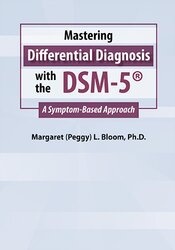

Take your DSM-5® diagnostic skills to the next level! This advanced recording is designed specifically for mental health professionals seeking to master clinical diagnosis and differential diagnosis using the DSM-5®, ICD-10 and online assessment tools. The focus of this workshop is on the key symptoms for each diagnosis, common differential diagnoses and frequent comorbid disorders of anxiety, depressive, trauma-related, substance-related, psychotic and neurodevelopmental disorders. Case examples and studies are provided throughout – giving you the opportunity to learn and apply a four-step symptoms-based diagnostic method. Topics include the clinical intake interview, differential diagnoses, online assessment tools to narrow diagnosis and potential comorbidities.
This online program is worth 6.25 hours CPD.
| File type | File name | Number of pages | |
|---|---|---|---|
| Manual - Mastering Differential Diagnosis with the DSM-5 (3.15 MB) | 56 Pages | Available after Purchase |

Margaret (Peggy) L. Bloom, PhD, Professor Emerita, Counselor Education and Counseling Psychology, Marquette University, Milwaukee, Wisconsin is a licensed psychologist and NCC certified counselor. Dr. Bloom is nationally recognized for her knowledge and expertise in assessment, DSM diagnosis, and counselor education. She is past chair and member of the board of directors of the Center for Credentialing & Education (NBCC), an elected fellow of the American Psychological Association (APA) and past president of the Association for Counselor Education and Supervision (ACES). Beginning her career as a psychiatric nurse and earning graduate degrees in nursing, counseling and a PhD in counseling psychology, Peggy brings a unique interdisciplinary perspective to each seminar. She has published numerous journal articles and presented professional education seminars across the world on assessment, diagnosis and counselor education.
Speaker Disclosures:
Financial: Dr. Margaret Bloom is a partner in Psycho-Pharm-Legal Consultants. She receives a speaking honorarium and recording royalties from PESI, Inc. She has no relevant financial relationships with ineligible organizations.
Non-financial: Dr. Margaret Bloom serves as a guest reviewer for The Clinical Supervisor and as a chair in the peer evaluations corps, Higher Learning Commission. She is a member of the American Counseling Association, the American Psychological Association, and the Association for Counselor Education and Supervision.
| 5 |
|
| 4 |
|
| 3 |
|
| 2 |
|
| 1 |
|
Satisfaction Guarantee
Your satisfaction is our goal and our guarantee. Concerns should be addressed to info@pesi.co.uk or call 01235847393.
Please wait ...